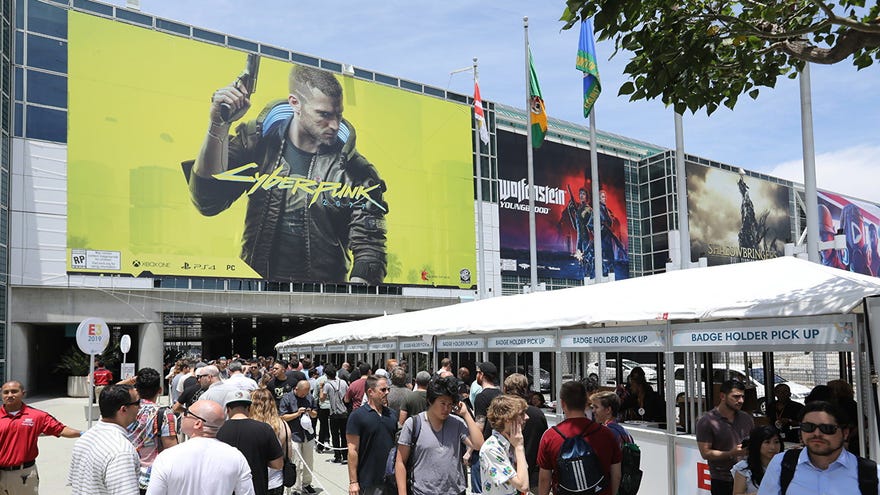I will miss E3 for its spectacle but mostly because it only lasted one week, not months
If there's one thing worse than E3, it's NotE3
It's no surprise to hear that E3 is officially dead. The games industry's annual mega-marketing event had been suffering for years, then skipping 2020 due to covid without an online alternative left space for its killers to aggressively expand and make clear quite how redundant E3 had become. On one hand, E3 was a week of misleading marketing, dubious claims, expensive stunts, and empty hype. On the other, the 317 assorted online events replacing E3 are just as bad, and now they sprawl across months. I miss E3. Bring back E3. I'm sorry, E3. I didn't know how good we had it. Please, bring back E3.
They won't, of course. They can't. E3's death was a long time coming, but I still think E3 could've held on as an anchor event had its organisers, the Entertainment Software Association not blown it when covid-19 hit.
E3 started as a trade show for a very physical games industry with games sold in brick-and-mortar shops and read about in magazines. It lost a little purpose with the rise of online shopping and digital distribution, but was still hugely valuable as a marketing event. E3 gathered the world's gaming media to watch staged demos for far-out games, play short demos for nearer games, ogle models, then head home laden with ugly t-shirts and thumbdrives full of faked screenshots to write up the experiences for people who'd never get to go. While E3 increasingly dabbled with making the event semi-public, the expo was already losing many of its stars. YouTube and streaming video meant publishers could advertise directly to their audiences in environments they wholly controlled. Nintendo, Sony, Electronic Arts, and more had already abandoned E3 in favour of hosting their own livestreamed or pre-recorded events. What we called 'E3' became a cluster of officially unassociated events taking place around the same week. Then covid came along and the ESA ummed and ahhed before cancelling E3 2020 and doing nothing in its stead. E3 not happening did not stop marketing from happening.
The calendar quickly filled with dozens of E3-esque online showcases and streams across June and July. Publishers ran their own events, many games websites hosted events gathering other games, Geoff Keighley started his Summer Game Fest, and communities banded together to showcase their scenes. By the time the ESA returned with an online-only E3 in 2021, everyone had experienced a world without E3. It had turned out to functionally be the same. Marketing was still seen, hype was still generated.
But oh, the experience was so much worse. While I was glad to see several showcases dedicated to games which traditionally had little presence at E3, everything combined was all too much. Too many streams spread across too many weeks and each lasting too long. It was just too much. No one can enjoy two straight hours of adverts, especially when half of them were shown on another two-hour showcase the week before. It's getting worse over subsequent years too, with streams growing longer and more self-indulgent while spreading across more of the summer. Only now do I appreciate the service E3 provided in focusing four months' worth of marketing into a single week.
E3 was also tolerable—even enjoyable!—because a dense concentration of marketing fosters spectacle. Big companies trying to grab attention and out-do each other created a ridiculous energy that's absent from NotE3. The huge publishers are always going to waste money on bad marketing rather than things you'd actually like to see, like development budgets or avoiding layoffs, so I think the least they can do is make it spectacular. Or embarrassing. Or, as was often the case, both.
E3 is as close as this industry gets to Eurovision, our Graham said in 2017. That was nice. I liked that. Now the closest we have is The Game Awards, Geoff Keighley's advert showcase which is so loathsome that it doesn't even pretend to be a serious awards show. I would absolutely rather see cars descending from ceilings than winners hurried off stage during heartfelt speeches so Geoff can devote more time to awkward guest appearances from celebrities he visibly aches to be pals with.
This is for selfish reasons, too. I miss E3 as a member of the games media. I never attended E3 because despite a Catholic upbringing, even I don't believe I deserve that punishment. But I did cover it remotely for a decade, watching streams and reading press releases and writing until 5am only to get up at 9 and start all over again. It sucked to outright lose a week of my life, remembering nothing I'd seen or done, but at least it was a one-off (and to be fair, that is probably about the level of punishment I deserve). While E3 was exhausting, I wasn't spending innumerable evenings and weekends watching hours-long streams which turn out to offer little to write about. God, to think all this once took only a week!
E3 was dead before its online-only return in 2021. It was doubly and triply dead when the ESA cancelled 2022's planned physical event then later the online event. It was quadruply dead by the time they announced 2023's plans for an in-person event organised with our parent company, ReedPop (uh, our current parent company?). Quintuply dead when they cancelled that too. Now it's sextuply dead, the final death. I miss it. If there's one thing worse than E3, it's NotE3.


